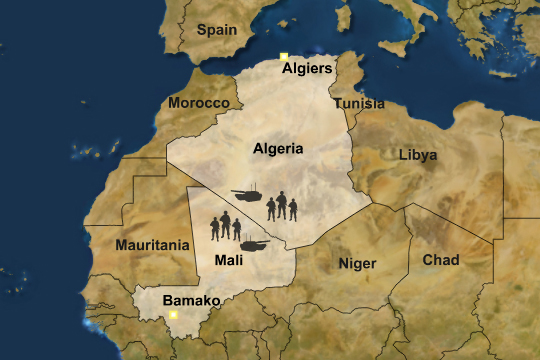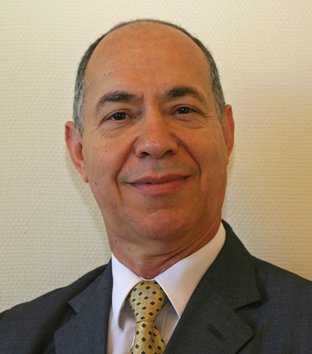
Introduction
The crisis in the Sahel, particularly Mali, has presented Algeria with a challenge unseen since the breakout of the war in the Western Sahara in the 1970s and the internal strife of the 1990s. The situation in Mali, which shares a border with Algeria of about 1,000 miles, has raised serious concerns not only for Algeria and its neighbours but also for Europe and the United States. While the Libyan civil war is not responsible for the conditions in Mali, it has undoubtedly exacerbated an already complicated situation.
The Sahel: “The Corridor of All Dangers”
An Algerian senior official once declared that the Sahel is “the corridor of all dangers” particularly for Algeria, which shares long stretches with this largely uncontrolled region characterised by trafficking of weapons, cigarettes, drugs, and humans. The region has also witnessed kidnappings; while Westerners constitute the main target of jihadists and the narco-traffickers, Algerians have also been the victims of abductions that aim to collect of funds to purchase weapons and other material. In April 2012, seven Algerian diplomats, including the general consul, were kidnapped in Gao, Northern Mali. Three were released in July but four are still held in captivity. (One is said to have been executed because the Algerians refused to pay the ransom the kidnappers requested). Algeria has been instrumental in the criminalisation of ransom payments to kidnappers.
Sahelian states are among the poorest in the world despite the fact that the region is quite rich in minerals and other natural resources including oil, uranium, iron ore, etc., a reality that explains the particular attention that major powers pay to it. A number of factors account for the attention paid to this region: 1) The competition between traditional and emerging powers (China, the European Union, the United States, India, Russia, and Brazil) over its natural resources 2)The presence of jihadists, particularly Al-Qaeda in the Islamic Maghreb (AQIM) and the Movement for Jihad and Oneness in West Africa (MUJAO), and the concomitant failure of the fragile Sahelian states to impose state authority over their territories 3)The possibility the area could become a new haven for terrorists, “Sahelistan,” a farfetched appellation given the geopolitical differences between Afghanistan and the Sahel where terrorists, including the Nigerian Boko Haram, can train and prepare operations against governments regionally and internationally 4)The issue of the Tuareg, the minorities in Algeria, Burkina Faso, Chad, Libya, Mali, and Niger, which for Algerians is of salient importance.
Algeria and the Tuareg Question
The Sahel has been a source of concern for Algeria for a long time due to a variety of reasons. Beyond the problem of terrorism, Algeria has been quite concerned about the turn of events regarding the Tuareg question and events in northern Mali after the collapse of the Gaddafi regime in Libya. The Tuareg issue is not new but it has taken dangerous proportions since Fall 2011. Colonial France’s redrawing of African borders resulted in the dispersal of the Tuareg population throughout the Maghreb and Sahel regions. However, as scattered as they are, the Tuareg have been able to maintain some links owing to the seasonal movements (transhumance) across the region. The Algerian government recognized the rights of its Tuareg population in the late 1960s and was resentful of Gaddafi, who accepted the creation of training camps and encouraged the emergence of a Tuareg independent movement and even the establishment of an independent Tuareg state as a way of exerting leverage over rival actors in the region, especially Algeria. One of the major consequences of the civil war in Libya was the massive return of the well-equipped and highly experienced Libya-based Tuareg to Mali and Niger in August 2011. Certainly, this has increased Algeria’s security concerns as effective management of the Tuareg issue has always been one of the pillars of Algeria’s strategy in the region. This explains why Tuareg aspiration for statehood has always been met with disapproval in Algiers. While Algerian policymakers empathise with Malian Tuareg, they view Tuareg claims for autonomy or irredentism suspiciously. Unsurprisingly, regardless of this empathy, they reacted negatively to the proclamation of the National Movement for the Liberation of the Azawad (MNLA) of an independent state in northern Mali in April 2012. This attitude is consistent with Algeria’s policy against secessionist movements and any political, social or ethnic categories that could threaten the internationally-recognised national unity and territorial integrity of a state. Since the late 1960s, Algerians have succeeded in integrating their Tuareg population into the political process through the representation of notables in the parliament or in the structures of the National Liberation Front (FLN) or by settling Tuareg populations in southern cities, providing them with the necessary modern means to improve their living conditions. Therefore, any secessionist desires are seen as a threat to Algeria’s own national security and territorial integrity. This is why Algeria has mediated between the Tuareg in northern Mali and the central government in Bamako in the 1990s, 2006, and 2012.
Algeria’s opposition to foreign intervention derives from the position of its foreign policy as well as fears that intervention may strengthen jihadist ideology and consolidate secessionist sentiments. The ideal scenario would be a political solution based on the separation of the Tuareg groups represented by the MNLA and Ansar Dine from AQIM and MUJAO. The rationale is that distinction would be twice as effective as addressing the Tuareg’s demands and also prove to be a fight against the terrorist groups, possibly with Tuareg assistance. Furthermore, foreign intervention has the potential of destabilising an already volatile region astride Algeria’s southern borders. One of the premises of the state's policy toward the Tuareg is that governments in the region should address the socioeconomic, political, and cultural demands of their respective Tuareg minorities. In fact, it was partly the non-compliance of the Malian president, Amadou Toumani Touré, with the Algiers-brokered agreements between the Tuareg and the Malian government that led to the events of early 2012, resulting in the debacle of the Malian army in northern Mali and the military coup that overthrew him. Surely, the coup that plunged Mali into a political crisis compelled Algeria to reassess the management of its security along its southern borders and seek a peaceful resolution for the conflict. It essentially aims to contain the effect of Azawad’s search for independence on other Tuareg populations in Mali, Niger, Libya and Algeria. In addition, there is fear that foreign intervention could lead to yet another influx of Malian refugees into Algeria, which already hosts about 20,000 Malian refugees that escaped earlier this year.
Ever since France decided that military intervention was necessary to preserve its interests in the Sahel region, Algeria has sought to convince its African partners to reestablish Mali’s territorial integrity through dialogue with the Tuareg.
Fighting Terrorism in the Sahel under Algeria’s Leadership
While Algerian authorities recognise the paramount necessity of resolving the Tuareg conflict, they also have taken into consideration the development of terrorism in the region. The activities of AQIM and, more recently, MUJAO (which has launched attacks in southern Algeria) is a matter of high concern. They acknowledge that the terrorist threat has been exaggerated but that it is nonetheless a reality that cannot be eluded, particularly with the emergence of new transnational actors (narco-traffickers and terrorists) and the ties between them. Potential alliances between the Tuareg and terrorist groups – as seen earlier this year between Ansar Dine and AQIM for instance – would clearly affect Algerian mediation efforts to resolve the Tuareg issue. This is the underlying reason for Algerian attempts to separate the Tuareg from the terrorist groups.
Algerian policy makers believe that the Sahel is critical for national security but also that Algeria is the natural leader in the region, a status recognised by regional actors whose armed forces and wealth cannot compare to that of Algeria; and this status is acknowledged by external powers such as the European Union and the United States as well. Algeria has enrolled its neighbours in the region (the “core countries,” Mali, Mauritania, Niger and even Nigeria) in a concerted regional strategy to contain AQIM in aims of cutting off its support. Moreover, with a relative degree of success, Algeria has elicited the adherence of Sahel countries to a vision that focuses on the settlement of regional security problems without the involvement of foreign powers, except in sectorial cooperation. It played a leading role in the creation of some regional organisations such as the Common Operational Joint-Chiefs of Staff Committee (CEMOC), located in Tamanrasset, and the Unified Fusion and Liaison (UFL), the intelligence arm of the core countries. This ambitious strategy has faced major hurdles including the strong relations between countries like Mali, Mauritania and Niger with France, which partly explains the suspicion among the core countries. One can argue that these suspicions and double-dealings have prevented the CEMOC from making more effective decisions. The involvement, under France’s influence, and war-mongering attitude of ECOWAS has alienated Algerians who nevertheless have accepted the principle of military action in northern Mali as a last resort but not before the separation of the Tuareg from terrorist and narco-trafficking groups.
Although Algerian policymakers have not rejected the principle of wider cooperation, they have viewed attempts to bring in Morocco into CEMOC or other Sahelian organizations suspiciously, asserting that Morocco is not a Sahelian state. Recognising Morocco as a Sahelian state would be tantamount to recognising Morocco’s sovereignty over the Western Sahara, which borders the Sahel. Furthermore, Algeria and Morocco compete over regional leadership; their tense relations over a variety of issues, including the question of Western Sahara, hinder close security and military cooperation between them.
Conclusion
Algerians are concerned about foreign military intervention in Mali because, from their perspective, it would further destabilise the already explosive conditions in the Sahel. To them, separating the Tuareg groups, who have legitimate demands, is vital. They also believe that dialogue should be established between Ansar Dine and the MNLA and among central government authorities in Bamako. According to them, this policy will isolate terrorist groups and their narco-trafficking allies. They insist on Mali’s territorial integrity and unity and demand that the authorities in Mali should resolve their internal difficulties. It would be wrong to assume that Algeria is opposed to military intervention or that it is soft in the fight against terrorism. Algerians will argue convincingly that they have been the main victims of terrorist groups for years. But, they wish to give peace a chance before engaging in a war that would destabilise not only Algeria and the Sahelian states but also countries like Tunisia, Libya, and Egypt that are undergoing complicated transitions. It remains to be seen whether their mediation efforts and those of Burkina Faso mediate between the Tuareg and the Malians bear fruit and thus spare the region from a war with unpredictable consequences.
*Yahia Zoubir is a professor of International Relations at Euromed Management, Marseille, France.
